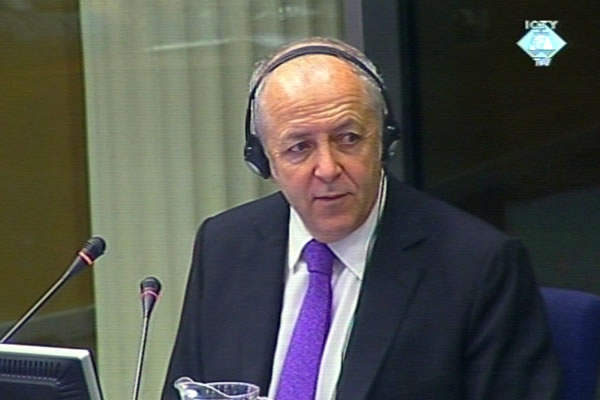Home
KARADZIC: ‘SARAJEVO WAS BESIEGED FROM THE INSIDE’
Continuing his cross-examination of British journalist Jeremy Bowen, Radovan Karadzic argued that Sarajevo had not been besieged by the Serb forces: in fact, the Bosnian government ‘besieged the city from the inside’, preventing the civilians from leaving Sarajevo
 Jeremy Bowen, witness at the Radovan Karadzic trial
Jeremy Bowen, witness at the Radovan Karadzic trial In the cross-examination of British journalist Jeremy Bowen, Radovan Karadzic challenged Bowen’s claims that the residents of Sarajevo were victims of a shelling and sniping campaign orchestrated by the Bosnian Serb army from 1992 to 1995. Karadzic suggested that the witness’s claims were contradicted even by the footage in the witness’s own war reports.
The BBC war reporter replied that he is ‘one hundred percent behind this claim’, adding that the Serb shelling and sniping campaign was a ‘way to spread terror’ among the people in Sarajevo and a means to pressure the Bosnian government. As the witness added, the Sarajevo’s youngest residents were often victims of this campaign. For instance, in Alipasino polje, several children playing in the snow were killed by a mortar shell.
Karadzic also tried to convince the witness that Sarajevo was not besieged by the Serb forces. On the contrary, the Bosnian government ‘put the city under siege from the inside,’ preventing the civilians from leaving Sarajevo. ‘Our policy in Sarajevo was to hold the enemy forces at bay and to wait for a political solution, Karadzic said, claiming that even high-ranking UN officials avoided using the term ‘siege’.
‘No, it was a siege’, the witness responded, noting that some UN staff tried to introduce new terminology to describe the situation of the Sarajevo residents ‘for political reasons’.
Karadzic disagreed with the witness’s claim that the Serbs led the way in ethnic cleansing in the former Yugoslavia. On the contrary, Karadzic argued, the Serb authorities in fact ‘made it more difficult’ for the Croats and Muslims to leave, demanding that those who ‘wanted’ to leave municipalities with a Serb majority obtain up to fifteen different documents, while ‘in Banja Luka, the most liberal municipality, they needed only three documents’.
The witness disagreed with Karadzic, reminding him that the refugees themselves told him more than once that they had been terrorized by the Serb forces and expelled from their homes. Some among their number were cruelly killed. Some of the stories were recorded in his war reports, shown in court. As for the documents Karadzic was talking about, Bowen recalled that the refugees had told him that the Serb authorities would allow them to leave if they signed over their entire property to them.
As the cross-examination drew to a close, Karadzic tried to contest the credibility of the witness and the validity of his war reports. As Karadzic noted, when the British journalist reported on the events in Israel, he violated the BBC’s ‘Holy Bible’: the basic tenets of principles of ‘accuracy and impartiality’. Bowen dismissed the accusations, saying that his work was never sanctioned. If Karadzic’s claims were true, he would not be appointed BBC Middle East editor, Bowen said.
The prosecution case continues at the Radovan Karadzic trial on Monday with the evidence of another protected witness.
Linked Reports
- Case : Karadzic
- 2011-01-13 ETHNIC CLEANSING AND HEARTLESS DAY IN SARAJEVO
- 2011-01-12 KARADZIC’S MOTION DISMISSED
- 2010-12-16 KARADZIC NOT CONVINCED ABOUT AUTHENTICITY OF PROSTHETIC LIMB FROM MARKALE
- 2011-01-17 KARADZIC ASKS FOR ANOTHER THREE-MONTH BREAK
- 2011-01-18 ‘PROFITABLE TARGETS’ OF THE SERB ARTILLERY
- 2011-01-19 SUFFOCATING SARAJEVO
